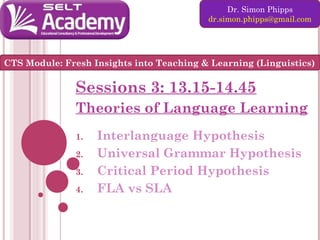
CTS-Academic: Module 2 session 3 theories of language learning
- 1. Dr. Simon Phipps dr.simon.phipps@gmail.com CTS Module: Fresh Insights into Teaching & Learning (Linguistics) Sessions 3: 13.15-14.45 Theories of Language Learning 1. 2. 3. 4. Interlanguage Hypothesis Universal Grammar Hypothesis Critical Period Hypothesis FLA vs SLA
- 2. INTERLANGUAGE THEORY Selinker 1972 morpheme studies error analysis L2 Learner language; L1 transfer overgeneralization simplification L2 Learners’ grammar is; systematic different from L1 and L2 Interlanguage (IL) is; o different from the L1 process o in a state of development o individual Some questions; How do learners link form and meaning? Is IL influenced more by L1 or UG? What are the processes which underlie IL development?
- 3. INTERLANGUAGE The learner constructs a system of abstract linguistic rules which underlies comprehension and production of the L2. This system of rules is viewed as a ‘mental grammar’ and is referred to as ‘interlanguage’ (Ellis 1997:33) Analysis of a learner’s interlanguage shows that it has some characteristics of the learner’s L1, some characteristics of L2, and some characteristics which seem to be very general. Interlanguages are systematic, but they are also dynamic, continually evolving as learners receive more input and revise their hypotheses about L2 (Lightbown & Spada 1993:55)
- 4. UNIVERSAL GRAMMAR THEORY 1 Chomsky 1960s, 1970s environment is not enough ‘Poverty of the input’ interaction is not enough Lack of negative evidence Learners’ grammar is ‘underdetermined’ by the input Universal Grammar (UG) is; Wired into the brain A set of properties that enable subsequent language development These properties exist within certain parameters They are ‘open’ until ‘set’ by exposure/experience All children start with UG principles All languages conform to these principles Children build up knowledge over time according to; what is available what is possible at that stage in cognitive development ‘innate knowledge of the principles of universal grammar permits all children to acquire the language of their environment during a critical period in their development’ (Lightbown & Spada, 2006:35)
- 5. UNIVERSAL GRAMMAR THEORY 2 Language acquisition is; growth of the mental organ of language triggered by certain language experiences UG is made up of; core grammar (rules, unmarked items) peripheral grammar (exceptions, marked items) Interlanguage may be influenced by UG, BUT UG is not concerned with SLA UG may not be relevant for L2 UG does not focus on performance UG does not focus on lexis Some complex grammar is learnt quite late Lexis cannot be learnt innately It is not clear whether UG is available later or not
- 6. CRITICAL PERIOD HYPOTHESIS (LENNEBERG 1967) After a certain age (9, 12, 14???) • it is no longer possible to ‘acquire’ language naturally and effortlessly • UG may no longer be available to learners BUT • there is disagreement on what it means and why • there does not appear to be a sudden cut-off point HOWEVER • There IS agreement that most learners are not able to learn an L2 naturally and effortlessly after a certain age
- 7. FIRST LANGUAGE VS SECOND LANGUAGE DEVELOPMENT Profile of language learners Learner characteristics and learning conditions Child L1 informal Child L2 informal Adolescent L2 formal Another language Cognitive maturity Metalinguistic awareness World knowledge Anxiety about speaking Freedom to be silent Ample time Corrective feedback (grammar, pron) Corrective feedback (meaning, word choice) Modified input (adapted from Lightbown & Spada 2006:31) Adult L2 informal
- 8. FIRST LANGUAGE VS SECOND LANGUAGE LEARNING Knowing another language Know how language works May make incorrect guesses Cognitive maturity, meta-linguistic awareness, world knowledge Older learners are better at problem-solving Language acquisition in L1 is an unconscious process Anxiety about speaking Young children are less concerned with making mistakes and sounding silly Not all children are willing to speak a language they do not know well Freedom to be silent Young children in L1 are allowed to be silent until they are ready to speak Older learners have no biological need for a silent period Ample time and exposure Limited exposure for learners in the classroom Overuse of L1 in the classroom may deprive learners of opportunities for exposure Corrective feedback L1 feedback tends to be meaning-based Classroom feedback is often not consistent Modified input Motherese Foreigner talk or teacher talk (graded language)
- 9. ASSUMPTIONS How do the processes of learning L1 and L2 (in the classroom) differ? Cognitive development, world knowledge L1 already exists Critical period? Teaching/corrective fb, learner needs, writing What are the implications of this for EFL/ESL? Maybe no automatic acquisition of L2 Need for formal instruction What are the implications of a critical period? It may not be possible to ‘acquire’ L2 automatically Need more than CI (I + 1) Focus on form, error correction, etc How is interlanguage theory innatist? o Errors are systematic o Must be sth. other than L1 and L2 What does the Natural Approach assume about language learning ? Some innateness No critical period Process of learning L2 is similar to process of learning L1 Classroom environment is enough Formal instruction does not help
- 10. Innate ability to learn language? Yes No Critical period? No Yes Learners can make use of innate ability at any age Process of SLA similar to FLA? No Yes L2 classroom exposure enough? Yes No Natural Approach Formal instruction Focus on form Error correction Conscious learning Lots of exposure Opportunities for interaction
